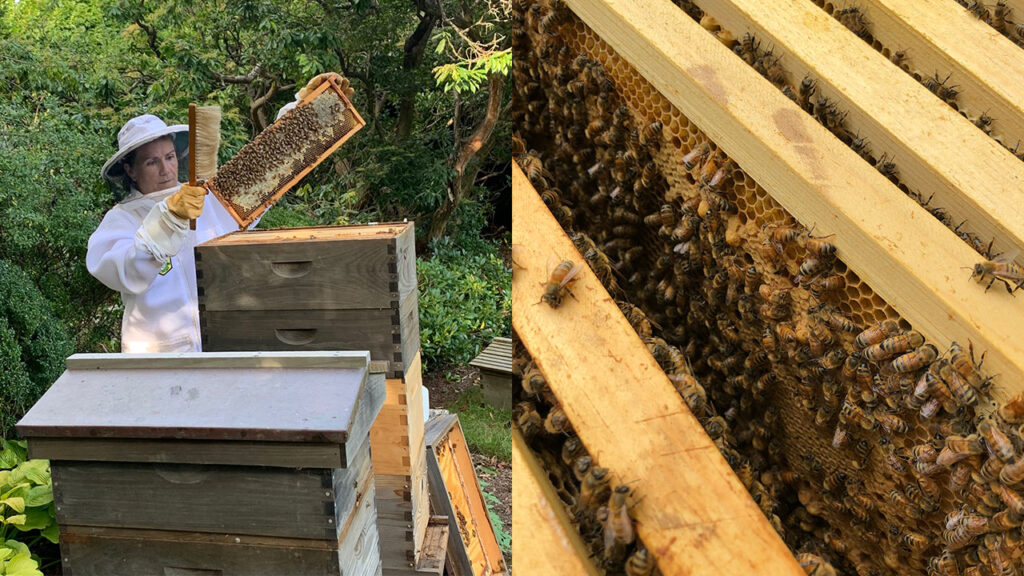Beekeeping and Mental Health
A Letter from One Mind CEO, Kathleen M. Pike, PhD:

Dear Friends,
As harvest season arrives and Thanksgiving approaches, I find myself back with my bees. Tending the hives in my backyard apiary always leaves me in quiet awe. The Apis mellifera, the western honeybee, lives in a world of breathtaking order and cooperation. Tens of thousands of bees share a wooden home of a few cubic feet, moving in perfect synchrony. Each one has a purpose, and together they create something extraordinary.
Observing the hive, the reality of interconnectedness is inescapable. A honeybee cannot survive alone. She is born into a collective that depends on her, just as she depends on them. When I lift the lid of the hive and see them communicating, passing nectar, fanning the air, dancing directions to one another, I’m reminded how much our own wellbeing relies on connection and how fundamental belonging is to our mental health. The hive is a living metaphor: when we feel connected, needed, and supported, our mental health strengthens. When isolation creeps in, wellbeing falters for both honeybees and people alike.
Honeybees don’t have the biological defenses that we do. They can’t form antibodies or adapt to new pathogens. Instead, they protect one another through behavior—gathering resins to create antimicrobial propolis that they use to line the inside of the hive, grooming each other to remove parasites, changing roles when needed. It’s a marvel of collective intelligence and care. For humans, too, much of our health and resilience depends on the environments we build together. Social systems that protect basic needs, foster psychological safety, and nurture kindness, empathy, and cooperation are the propolis that keep our own hives strong.
Despite all their sophistication, honeybees are vulnerable. In 2025, about half of all hives collapsed, strained by pesticides, parasites, and environmental change. It is a sobering reminder that resilience has limits; that sustained pressure without relief can overwhelm even the most adaptive communities. The parallel to mental health is hard to ignore. When stress accumulates without adequate support or relief, individuals and systems alike fracture and struggle. The antidote lies not only in caring for those in crisis, but in building stronger, safer environments that protect and promote wellbeing upstream.
The bees’ consummate lesson is, of course, the honey. In a world filled with noise, uncertainty, and constant headlines of crisis, it’s easy to feel overwhelmed. The barrage of bad news can eat away at our mental health and wellbeing. But the honeybees remind me what it means to stay focused on what’s possible. A single forager makes about 1,500 flights and contributes just one-twelfth of a teaspoon of honey in her lifetime. Yet, together, through steady work and shared purpose, the hive can produce 30, 60, even 100 pounds of honey. Each bee simply does what she can—and the collective result is liquid gold—a reminder that when we, too, focus on what’s within our reach, one small act at a time, something extraordinary takes shape.
In this month of Thanksgiving, I am grateful for the bees’ quiet lessons and for all of you who are helping create communities that prioritize mental health so that people can live healthy, purposeful, and joyful lives. May this season remind us that wellbeing, like honey, is made drop by drop and with a shared commitment to the health of the entire hive.
Best,

Kathleen M. Pike, PhD
Chief Executive Officer, One Mind
Stay Connected
Sign up to receive the latest updates on our work addressing the global brain health crisis, including inspiring stories, research updates, and upcoming events
